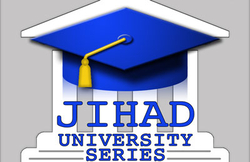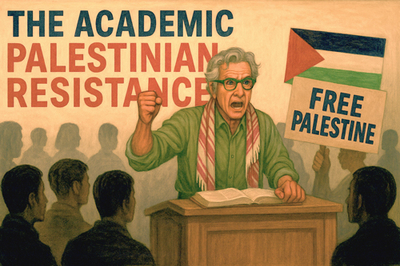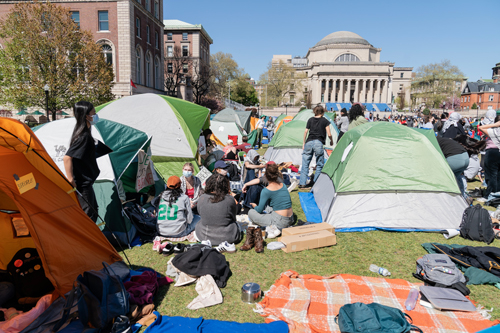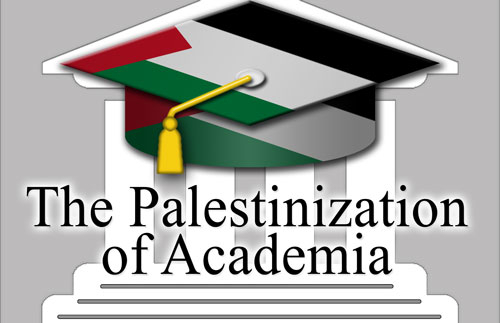 The following article is a continuation of the IPT's Jihad University Series.
The following article is a continuation of the IPT's Jihad University Series.
From their support for the Boycott Divest Sanction (BDS) movement, to hosting terrorists, to accepting terrorist tainted funding, some of the nation's top universities have become part of the Palestinian resistance.
Radical U – Part 1: How Professors Became Architects of the Academic Palestinian Resistance
by A.J. Caschetta
Special to IPT News
August 14, 2025
 Image generated by AI |
For decades, academics have fostered friendly territory for radical groups and fertile ground for anti-Israel propagandists, but few have endorsed terrorism. It's safer to massage the language, twist a metaphor or two, and figure out a way to excuse violence without actually endorsing it, or at least use language, often abstruse or cryptic language, to provide a degree of deniability. But that has changed.
October 7 triggered something in many academics who suddenly no longer felt constrained. Rather than stopping just short of applauding terrorism against Israel, they adopted Hamas's slogans and defended its attacks. Today, colleges and universities have effectively taken the place of the Palestinian terrorist organizations as the primary disseminators of anti-Israel propaganda to Americans. Middle East studies departments and programs in particular have transformed academia into the vanguard of anti-Zionism in a sick perversion of John Stuart Mill's vision for higher education – turning students into "capable and cultivated human beings."
The "Palestine & Praxis" Movement
Along the path to academia's shocking embrace of Hamas, some moments stand out. The 2006 Hezbollah War and the 2008-9 and 2014 Hamas Wars certainly brought new adherents to the BDS movement, but it was the 2021 Hamas War that inspired many academics to graduate from observers to self-described participants in the Palestinian cause.
Coming nearly a year after the BLM/George Floyd riots, with most college classes still being "taught" via Zoom, the brief war (May 10-21, 2021) riled a pandemic-restless academia which spontaneously exploded with a flurry of nearly identical statements and petitions expunging Hamas and blaming Israel for the war.
Of the more than 300 "solidarity statements," one of them, titled Palestine & Praxis:Open Letter and Call to Action by "Scholars For Palestinian Freedom," became the manifesto of a new movement. It provided a language to mimic and a template to follow. The word "praxis" (Greek for "practice," as opposed to theory) became the jargon term du jouridentifying this new movement, and every anti-Israel academic with an axe to grind found a fashionable "praxis" angle.
Some took to "archiving praxis in Palestine," while others explained the "praxis of Palestinian democracy." The Palestinian Feminist Collective developed a "Feminist Praxis for Academic Freedom in the Context of Genocide in Gaza."
For the Fall 2022 publication of the Association for Jewish Studies, Atalia Omer, a professor of religion, conflict, and peace studies at Notre Dame, called for "a praxis of restorative justice" that would "interrogate historically the Zionization of Jewishness."
In 2023, an organization called Radical in Progress (its "goal is to equip aspiring activists with the vocabulary, knowledge, and strategies they need to radically reimagine the future") published a "Praxis study guide" to Rashid Khalidi's 2020 book The Hundred Years' War on Palestine.
In the Spring 2024 encampment semester, SJP sponsored an Anthropology conference at Princeton titled "Palestine as Praxis, Still."
A Call to Action
Whatever else the term implied, praxis meant action. The scholars boldly declared in their "Call to Action" that, "the critical theory we generate in our literature and in our classrooms must be backed in deed."
Like every other war between Israel and Hamas, the one in 2021 began with a Hamas attack. On the evening of May 10, Hamas and PIJ began firing what would amount to over 4,000 rockets and missiles into Israel. Many, but not all, of the missiles were intercepted by the Iron Dome system, and Israel responded with another restrained "mowing the grass" mini-war called Operation Guardian of the Walls, targeting launch sites, command centers, and known tunnel locations. But these facts are irrelevant to the authors of the "Call to Action" who mention Hamas only a single time in their statement, where they dismiss facts as "a series of stale talking points about Hamas rockets."
Therefore, the scholars declared, "research and writing are not enough."
"Scholarship without action normalizes the status quo and reinforces Israel's impunity," they asserted.
Centering Decolonization
Some of the actions the scholars call for are straightforward, like "supporting student activism on campus," and "call[ing] for Boycott, Divestment and Sanctions of Israel," but the academic jargon gets thick at a crucial point in the argument: "Scholarship must also be ethical by centering decolonization and raising the voices of Palestinian scholars, as well as other interlocutors."
In plainer English, "centering decolonization" means fighting against Israel, which the authors believe is a "colonial-settler apartheid state" committing "genocide" against the "indigenous" Palestinians and attempting to "erase" them and their culture. Against such an enemy, actions are needed – "it is no longer acceptable to treat Palestine as a playground for intellectual curiosity."
In his line-by-line takedown of the statement, "Fisking 'Scholars' for Palestine," Richard Landes glosses these lines as the leaders of the movement urging their fellow "scholars to leave your ivory carrels and take that weaponized post-colonial propaganda to the streets and wage war."
The second half of that sentence calling for "raising the voices of Palestinian scholars, as well as other interlocutors" plays into the "marginalized Palestinian scholar" trope. Portraying Palestinian scholars as pushed aside, ignored, and denied academic freedom was unpersuasive in 2021.
Edward Said, a Palestinian, invented the field of "post-colonial studies" in the 1970s when he taught comparative literature at Columbia University. Today, hundreds if not thousands of Palestinian academics teach in the U.S. alone. Some of them are very well known, like former PLO spokesman Rashid Khalidi, who taught at Columbia University's Center for Palestinian Studies for decades prior to his recent retirement, and Beshara Doumani, who was named, with much fanfare, the first endowed chair in "Palestinian Studies" at Brown University in 2020. Noura Erakat, a professor of Africana studies at Rutgers University and Sherene Seikaly, a history professor at the University of California, Santa Barbara, who happen to be the first and second signatories of the "Palestine & Praxis" statement, and therefore likely its authors, are Palestinians.
Raising Voices
Importantly, the "Call to Action" never specifies who the "other interlocutors" it wants to highlight might be, but it's not difficult to conclude that it's people like PFLP terrorist Leila Khaled, whom the faculty at San Francisco State University (SFSU), led by another Palestinian academic, Rahab Abdulhadi, a professor of ethnic studies, had been promoting and inviting to lecture to their students via Zoom and YouTube.
When it comes to "raising the voices" of Palestinians, few publications can compete with Mondoweiss. In 2022, Abdulhadi wrote a long piece for Mondoweiss titled "Teaching Palestine 2022: Pedagogical Praxis and the Indivisibility of Justice" outlining ways to "center decolonization." In a 2024 interview with Leila Khaled, Mondoweiss introduces the most famous Palestinian airplane hijacker this way: "Khaled did most of her resistance work with the Popular Front for the Liberation of Palestine (PFLP)."
Equating airline hijacking and taking hostages with a legitimate career – "resistance work" – is the kind of normalizing violence that "Scholars for Palestinian Freedom" engage in as they "center decolonization."
Another example is Somdeep Sen's November 12, 2021, Zoom lecture with Brown University promoting his book Decolonizing Palestine (2021). Sen, another professor interested in "raising the voices" of Palestinians, actually suggests techniques to "normalize Hamas" by focusing on its governing abilities.
With their Palestine & Praxis movement in 2021, and throughout the ensuing years, many academics inched up to the line dividing rhetorical advocacy and violence, but they stopped short of crossing that line. Their students did not.
Tomorrow, "Radical U – Part 2: How Students Turned their Professors' Words into Deeds"
 Chief IPT Political Correspondent A.J. Caschetta is a principal lecturer at the Rochester Institute of Technology and a fellow at Campus Watch, a project of the Middle East Forum where he is also a Milstein fellow.
Chief IPT Political Correspondent A.J. Caschetta is a principal lecturer at the Rochester Institute of Technology and a fellow at Campus Watch, a project of the Middle East Forum where he is also a Milstein fellow.
Copyright © 2025. Investigative Project on Terrorism. All rights reserved.
Articles by the IPT may be re-published as long as full attribution and a link back to the original article is provided. |



 Radical U – Part 2: How Students Turned their Professors' Words into Deeds
Radical U – Part 2: How Students Turned their Professors' Words into Deeds
 Whitewashing Anti-Israel Campus Protests
Whitewashing Anti-Israel Campus Protests
 Breaking the Brand: the Palestinization of Academia
Breaking the Brand: the Palestinization of Academia